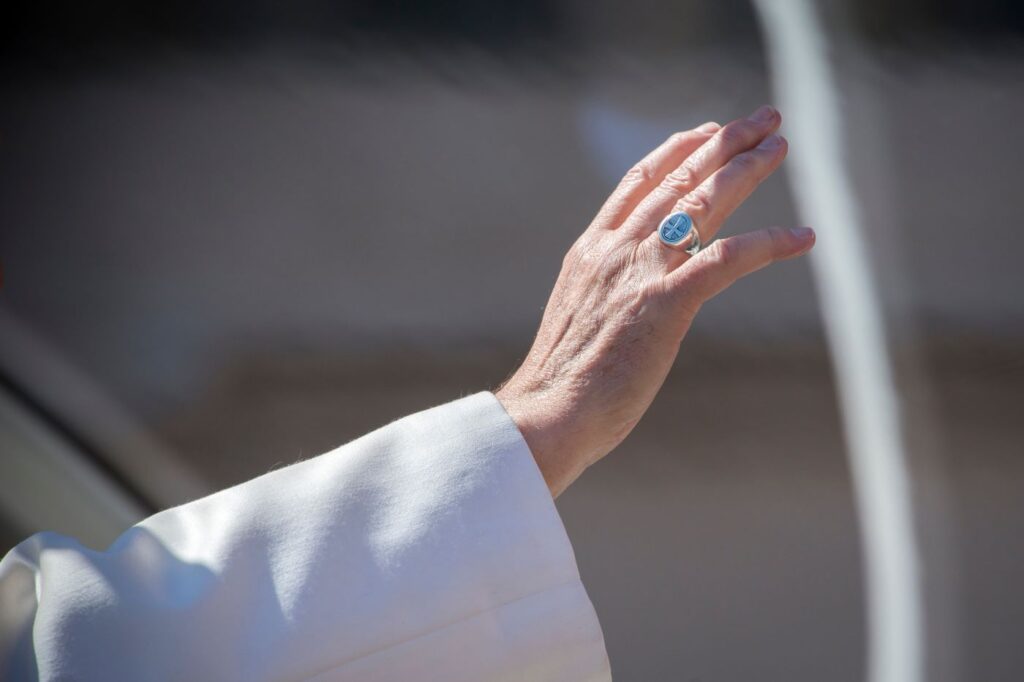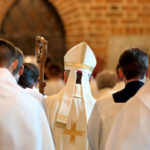The confusion, scandal, and public division caused by the Vatican’s recent document Fiducia supplicans (FS) is without comparison since the promulgation of Humanae vitae in 1968. This time, however, the opposition comes from those who wish to hold on to the tradition of the faith rather than tear it down, as was the case with the opponents to Humanae vitae. In some respects, the situation with FS is unprecedented in modern times, as no bishop or bishops’ conference explicitly rejected Humanae vitae, but just offered its own reading of it, as many are doing with FS. What is new is the direct rejection of FS, which did not happen with Humanae vitae.
It would be charitable to say that the global response from bishops to FS has not been favorable. Cardinals and bishops in Eastern Europe, Asia, the Pacific, South America, and Africa, as well as Eastern rite bishops—many of whom are bishops appointed by Pope Francis—have publicly and explicitly rejected FS. This is no small thing, both with respect to the substance of the objections and the ecclesiastical consequences of such public opposition from bishops to the Holy Father.
The opposition of these bishops is theologically significant. The fact that so many bishops have publicly opposed the document as such (and not merely offered their reading of it or limited its application in their diocese) means that one cannot say that this is a teaching of the “universal ordinary Magisterium”—that is, teaching taught by all the bishops scattered throughout the world in communion with the Pope (cf. Lumen Gentium 25).
The fact that so many bishops have publicly opposed the document as such means that one cannot say that this is a teaching of the “universal ordinary Magisterium.”
Start your day with Public Discourse
Sign up and get our daily essays sent straight to your inbox.As one theologian with extensive Roman experience recently put it in private correspondence with me:
The crisis of this pontificate was clearly manifested by the publication [on December 18] of the declaration Fiducia Supplicans by the Dicastery for the Doctrine of the Faith [DDF]. Precisely between two synods on synodality, a dicastery publishes a text of grave consequences for the teaching and the mission of the Church, without even taking into account the cardinals who were members of the Dicastery and without any prior consultation with the rest of the episcopate. This recklessness has provoked the outright rejection of the text by numerous bishops and even entire episcopal conferences, which is unprecedented in the recent history of the Church and deeply damages her unity. Moreover, what Fiducia Supplicans teaches has no support in the tradition of the Church and denies, not in words but in the actions it allows, the Catholic doctrine on sexuality. It thus conveys a vision of the Magisterium that can be rewritten by the current Pope in a creative way, as if the Pope were above the Word of God revealed and handed down in the Church. If Pope Francis does not withdraw this document, it will be a high priority for the next Pope to repair the damage of this text [issued by] Cardinal Victor Manuel Fernández.
It is revealing that the theologian I quote here is referenced anonymously. Such is the nature of the current Roman environment, marked as it is by fear of retaliation.
How this plays out over the balance of the Francis pontificate is anyone’s guess, but it is hard to imagine a way in which the fallout from FS does not severely harm the Holy Father’s ability to direct the Church according to his pastoral vision. Cardinal Fernández, empowered by Pope Francis as the chief defender of the faith, is now also severely impaired in his ability to exercise his office. This is a self-inflicted wound that is not a surprise to those who were paying close attention to the style and substance of Cardinal Fernández’s writings prior to his time at the Dicastery for the Doctrine of the Faith (DDF) and his comments over the first few months of his leadership of the most important dicastery in Rome. With the support of Pope Francis, he clearly intended to rapidly push a new approach to moral and pastoral theology. He has now done so, with devastating results. Confusion now pervades and division has been fostered.
For those of us who had serious concerns about what Cardinal Fernández would bring to the universal church, we can only hope lessons have been learned. I am not especially hopeful on this front considering his past comments and his commitment to a “creative” theological approach and a “paradigm shift” for his office.
The bigger and more interesting question with respect to FS is how the bishops of the world will respond if correction is not made from the DDF and the Holy Father himself. Pope Francis sometimes claims bishops do not promote Vatican II. The profound irony, of course, is that Vatican II emphasized the unique collegial authority of bishops, not as branch managers of the pope but as pastors with proper authority that belongs to them as the chief shepherd of their diocese. Many of them are now standing up to what they see as harmful action coming from the Vatican. This exercise of local authority is very much the fruit of Vatican II; so the Holy See can now honor the ecclesiology of Vatican II or reject it by forcing bishops to submit to Rome in how they pastorally guide their flocks.
The conclusion of the FS fallout, sadly, is obvious to all but the most ideologically blinded: this is a deeply flawed pontificate. The Church is perhaps more divided than at any time since the immediate aftermath of Vatican II. This time, however, the division is sown from above rather than below.
When the German bishops or our own Fr. James Martin, SJ, publicly advances what is against the Catechism of the Catholic Church, not to mention the Scriptures, without serious reprimand from Rome, there is a crisis. When these same leaders are encouraged from Rome, there emerges an even greater crisis.
At this point, it seems clear that the Vatican is not going to correct the Germans in any meaningful way or discipline Fr. Martin, who is leading souls on a very dangerous path with the implicit support of the Holy Father. The time has come for bishops, in their capacity to lead the faithful entrusted to them, to stand up to the various scandals, including the scandal of FS—charitably, but clearly and publicly. Too much is at stake.
In particular, the bishops here in the United States have an opportunity to assert their own pastoral authority. Even if the impression from the Vatican is that the Church here in the United States is “backward looking,” American bishops have been respectful and deferential to the Holy Father. There is a clear reluctance by American bishops to openly criticize the Holy Father. This has served the unity of the Church well and is obviously the proper disposition for any bishop toward the Holy Father.
Nonetheless, now that Cardinal Fernández has said bishops can discern for themselves how best to follow FS in their dioceses, they should feel more freedom to clarify how they read FS and how their priests should follow its guidance.
In addition, it is important to remember that bishops are not only responsible for their diocese, but also, as members of the College of Bishops, for the universal Church. Thus, it is not enough for them to offer guidelines for Fiducia’s application in their diocese. For, as Lumen Gentium 23 makes clear, even though the bishops do not “exercise their pastoral governance” “over other Churches nor over the Church universal,” “each of them, as a member of the episcopal college and legitimate successor of the apostles, is obliged by Christ’s institution and command to be solicitous for the whole Church. . . . ” A core obligation of bishops, therefore, is to “promote and safeguard the unity of faith and the discipline common to the whole Church. . . .”
A current and common argument claims that, with FS, nothing has really changed. The Church has always blessed individuals and that is what FS permits without revising anything about the sacraments. This, however, is far too generous a reading of a deeply problematic text.
FS affirms that the Church can, and in some circumstances, should, bless couples as couples who are in “irregular” unions. That is, the Church should bless, among others, same-sex couples. It does so by creating a new category of blessings that is outside the sacramental environment.
The media claim that the Church has opened the door to something new is generally correct. FS indeed is doing something different. FS is not just a matter of semantics about who is blessed. The blessing of same-sex couples as couples, which seems to be the focus of the Holy See’s action, is what the document permits and encourages.
It has been heartening to see the response from bishops around the world who reject this new thing. No doubt there is a need to affirm the duty to be loving and open to all people who approach the Church, which is the instinct of practically every bishop and priest—regardless of mischaracterizations to the contrary. But distinctions must still be made. In 2021, the same DDF declared that sin cannot be blessed. This still holds. It would be helpful if more bishops recognized that even though FS states otherwise, “irregular” unions cannot be blessed.
This is not an easy time to be a bishop, especially as the DDF fosters confusion, but every bishop is called to lead the faithful into a deeper relationship with Christ through the Church. This requires heroic charity that embraces the sinner while being truthful to the Gospel.
This would clarify for the faithful what the Church can and cannot do. It would also provide important pastoral guidance for priests who might otherwise act in a way that leads people to erroneously believe their objectively sinful situations are not spiritually dangerous. Priests might also feel targeted by activists who approach them demanding a blessing for an “irregular” situation. Cover from their bishops would no doubt be a welcome step for priests to know they are protected by their bishop when they bless the individual but not the couple.
The case of Father Martin is of particular interest. Even though he has caused great scandal (against what FS teaches), he can offer an interpretation of FS that allows for his actions. For he was not wearing liturgical vestments, and FS does not say that the blessing must be done in private. In fact, Fr. Martin has nullified Cardinal Fernández’s efforts to minimize the changes brought about by FS. Who would believe Cardinal Fernández when he says that FS is not scandalous, considering that FS allows Fr. Martin’s actions?
This is not an easy time to be a bishop, especially as the DDF fosters confusion, but every bishop is called to lead the faithful into a deeper relationship with Christ through the Church. This requires heroic charity that embraces the sinner while being truthful to the Gospel. Jesus never blessed sin, and neither should the Church. His love for each of us is a love that calls us out of sin, which requires a recognition that some things are incompatible with the blessing of the Church.
FS is a flawed document. Bishops would do well to treat it as such.
Image by Antoine and licensed via Adobe Stock. Image resized.













